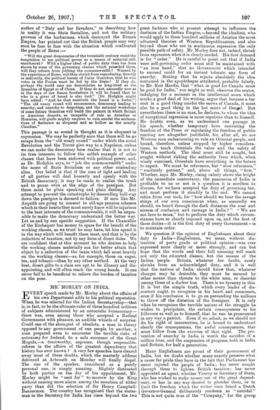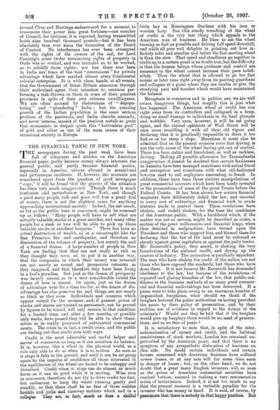MR: MORLEY ON INDIA. E VERY speech made by Mr. Morley
about the affairs of his own Department adds to his political reputation. When he was selected for the Indian Secretaryship—that is, in fact, to be the ultimate ruler of three hundred millions of subjects administered by an autocratic bureaucracy— there was, even among those who accepted. a. Radical Government with pleasure, an audible whistle of surprise. Could one of the strongest of idealists, a man in theory opposed to any government of one people by another, a man prepared even to encounter the terrible risks of autonomy for Ireland, be a safe successor of the Great Moguls,—a trustworthy, supreme, though responsible, referee in the affairs of the greatest dependency that history has ever known P A very few speeches have cleared away most of these doubts, which the masterly address delivered at Arbroath on Monday will finally dispel. The rise of the speaker, considered as a purely personal one, is simply amazing. Slightly distrusted by both parties on the day of his appointment, Mr. Morley might be " sent for " to-morrow by the King without causing more alarm .among the members of either party than did the selection of Sir Henry Campbell- Bannerman. The country has recognised that the states- man in the Secretary for India has risen beyond the two great factions who at present attempt to influence the destinies of the Indian Empire,—beyond the idealists, who would apply to three hundred millions of Asiatics the most advanced theories of Western Republicanism, and also beyond those who see in continuous repression the only possible path of safety. Mr. Morley does not, indeed, shrink from repression when it is clearly needed. His first demand is for " order." He is careful to point out that if India were self-governing order must still be maintained with " an iron hand," that no Government which intended to succeed could for an instant tolerate any form of anarchy. Stating that he rejects absolutely the idea contained in the apophthegm attributed, probably falsely, to Mr. Keir Hardie, that " what is good for Canada must be good for India," you might as well, observes the orator, indulging for a moment in the intellectual scorn which marks a good deal of his writing, argue that because a fur coat is a good thing amidst the snows of Canada, it must also be a good thing in the hot mists of Bengal. But nevertheless there is no man, he declares, to whom the idea of exceptional repression is more repulsive than to himself. He doubts even, as we understand one passage in his speech, whether temporary laws restricting the freedom of the Press or regulating the freedom of public meeting are altogether justifiable, for, after all, we are Western men endeavouring to rule an Oriental people, and bound, therefore, unless stopped by higher considera- tions, to teach Orientals the value and the safety of Western methods. The ideal must still be sought, but sought without risking the authority from which, when wisely exercised, Orientals have everything in the future to expect. We must be reformers, but " slow reformers," " resolutely patient," and, above all things, " firm." Whether, says Mr. Morley, rising calmly above the height of the immediate controversy, the possession of India is profitable to us or not is a question it is needless to discuss, for we have accepted the duty of governing her, and must perform it steadily to the end. We cannot retire from our task, for " how should we bear the savage stings of our own consciences when, as assuredly we should, we heard through the dark distances the roar and scream of confusion and carnage in India ? " " We are not here to muse," but to perform the duty which circum- stances have so clearly imposed upon us, and the first of those duties—it is the first duty of every Government— is to maintain order.
We question if the opinion of Englishmen about their duty to India—Englishmen, we mean, without dis- tinction of party grade or political opinion—was ever expressed more clearly or more strongly, and can but hope that the words and their full meaning will reach not only the educated classes, but the masses of the Indian people. Britain, whatever her faults, rarely shrinks from an acknowledged duty, and it is well that the natives of India should know that, whatever changes may be desirable, they must be secured by other means than threats to the white men, or disorder among those of a darker hue. There is no tyranny in this. It is but the simple truth, which every leader of dis- content ought to recognise in his heart and conscience, even if his conclusion is to go on persuading the millions to throw off the dictation of the foreigner. It is only when he recognises the terrible nature of the struggle he wishes to precipitate, the certain consequences to his followers as well as to himself, that he can be pronounced in any way a patriot. Even if we admit, as we should not do, his right of insurrection, he is bound to understand clearly the consequences, the awful consequences, that must follow from the exercise of that right. The pre- vention of anarchy in India is worth the sacrifice of a million lives, and the suspension of progress, both in India and Britain, for half a generation.
Many Englishmen are proud of their government of India, but we doubt whether many exactly perceive what a cause for pride they have in the fact that Parliament has never injured the people of India ; has never sought through them to lighten British taxation ; has never appointed an agent, whether Viceroy or Secretary of State, who has wished to make money out of the great depend- ency, or has in any way desired to plunder them, or to limit the freedom which the writer once heard a Dutch Governor-General deliberately condemn as " suicidal." This is not quite true of the " Company," for the group around Clive and Hastings endeavoured for a moment to transmute their power into great fortunes—one member of Council, for instance, it is reported, having transmitted home nine hundred thousand pounds—but it has been absolutely true ever since the formation of the Board of Control. No interference has ever been attempted with the rights of the owners of the soil, for Lord Canning's great Order terminating rights of property in Oude was so worked, and was intended so to be worked, as to solidify those rights ; nor has there ever been in India any trace of the vast " concessions " for private advantage which have marked almost every Continental colonial enterprise. It is with clean hands, at all events, that the Government of Great Britain announce through their authorised agent their intention to continue per- forming a task thrown on them in some of their greatest provinces in spite of their own extreme unwillingness. We are often accused by rhetoricians of " depopu- lating " and " plundering " India ; but the amazing growth of the Indian population is the most serious problem of the peninsula, and India absorbs annually, and never returns, masses of the precious metals so great that economists in despair quote this " bottomless pool " of gold and silver as one of the main causes of their occasional scarcity in Europe.











































 Previous page
Previous page